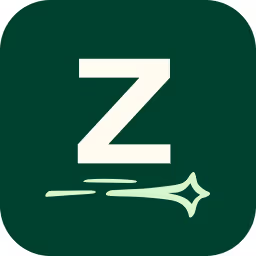Octolens Alternatives
Explore a detailed comparison of 10 Octolens alternatives. We analyze features, pricing, and performance to help you choose the right tool.

Octolens is a tool you may already use for specific reasons. It has clear strengths and performs well in several key areas, which is why it has a dedicated user base. It gets the job done for many people.
However, some users note limitations that can impact workflow, which may be why you are here. We have identified the best Octolens alternatives and analyzed their pros and cons from G2 reviews to help you choose. Let's get started.
Consider 11x for Digital Sales Workers
If you want to add digital workers to your sales process, 11x is an option to explore. The platform provides digital employees for sales tasks. This can help your team manage outreach and follow-up activities.
11x is a go-to-market platform that uses AI agents to handle sales processes. These agents operate with a degree of autonomy to manage sales functions from start to finish.
The platform provides agents like Alice, who finds prospects, conducts outreach, and updates the CRM. Another agent, Julian, qualifies inbound leads and books meetings for the sales team.
This approach means 11x can replace separate tools for data enrichment, outreach, and email warmup. It combines these functions into one platform.
Octolens Alternatives
Here is a detailed breakdown of the top Octolens alternatives. We will analyze each tool's pricing, features, and its specific advantages and potential drawbacks to inform your choice.
1) ZoomInfo
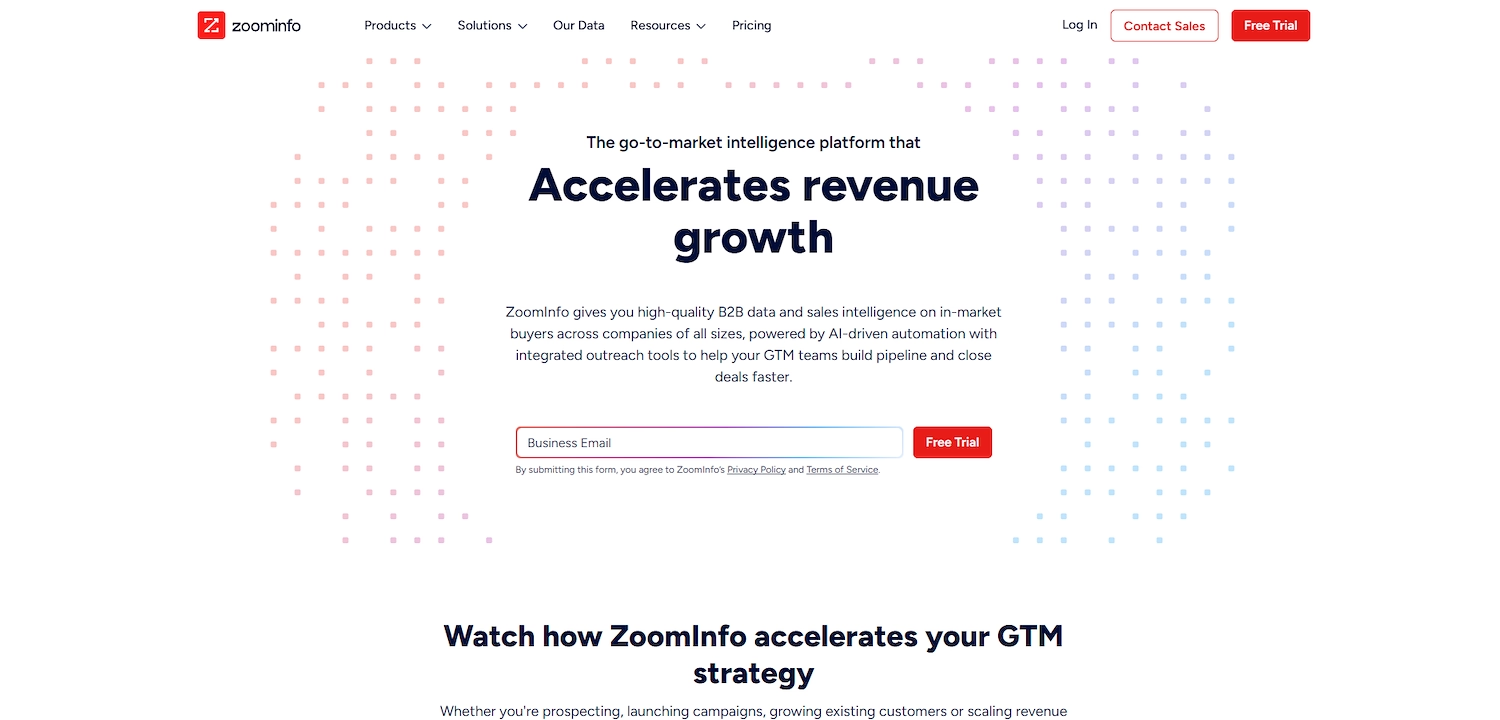
ZoomInfo is a go-to-market intelligence platform with a B2B data and software system. It gives companies verified contact data and real-time buyer-intent signals to help them identify and connect with valuable buyers.
Users can prospect, prioritize lead lists, and personalize marketing campaigns. The system also automates outreach, enriches CRM records, and identifies anonymous website visitors to help build a sales pipeline.
ZoomInfo's Main Features
- Provides contact and company search capabilities, buyer intent data, and website visitor tracking.
- Offers sales automation for phone and email outreach, along with conversation intelligence for call analysis.
- Includes workflow automation and tools for lead and CRM enrichment to maintain data quality.
- Features a generative-AI assistant, Copilot, to automate tasks and provide recommendations for next actions.
How ZoomInfo Compares to Octolens
Average Review score: 4.5/5 stars based on 8,738 G2 reviews.
- ZoomInfo provides an AI assistant, Copilot, for recommendations on contacts and messaging. This differs from Octolens, which does not have a comparable AI-guided function.
- It offers buyer intent data, which helps find companies actively looking for your services. This is a more advanced feature than the basic contact data functions available in Octolens.
- The tool includes sales engagement functions, such as an auto dialer and email automation. This combines outreach with data, whereas Octolens requires separate tools for engagement.
- Its database includes detailed company information and industry research. This offers a wider scope of data compared to the more focused dataset in Octolens.
Potential Downsides Compared to Octolens
- Some users report that ZoomInfo's contact information can be inaccurate or outdated. This is different from Octolens, which provides a more focused dataset that may offer higher accuracy for its specific use case.
- The platform is extensive and can take about a month to implement fully. Teams that need a simple, ready-to-use tool might find the more straightforward nature of Octolens to be a better fit.
- ZoomInfo represents a significant financial investment, as indicated by its premium price point. In comparison, Octolens is often a more budget-friendly choice for companies that do not need such a broad range of features.
Cost and Value Analysis
ZoomInfo operates on a custom pricing model that aligns with its premium features, making it a larger investment than the more budget-friendly Octolens. For specific pricing details, it is best to consult ZoomInfo’s official website.
2) Apollo.io
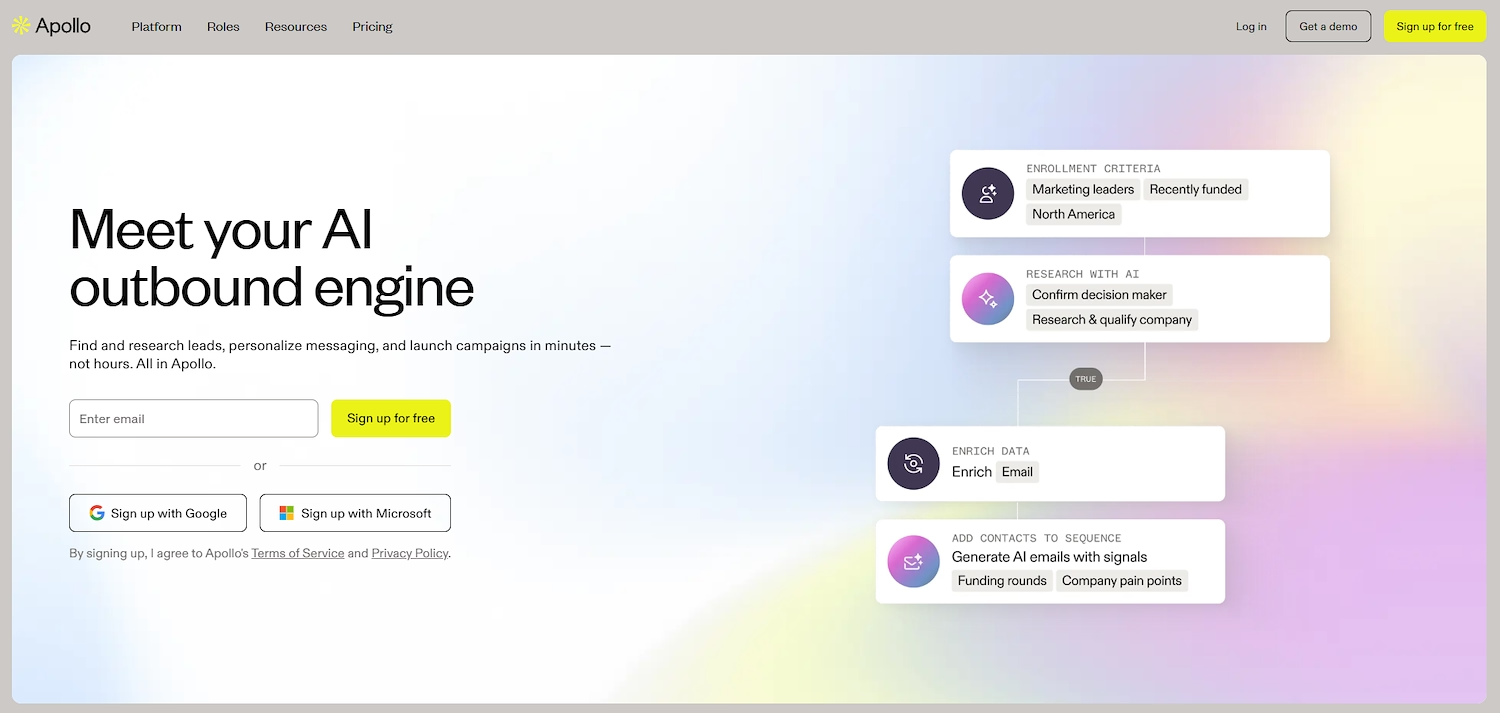
Apollo.io is an end-to-end sales platform. It provides a B2B database and tools for outreach. Sales teams use it to find contact information and connect with potential customers. The platform combines data with engagement features to support the sales cycle. It acts as a unified solution to find prospects and close deals.
Apollo.io's Main Features
- Offers a B2B database for prospect discovery and contact retrieval.
- Includes integrated tools for sales outreach and prospect engagement.
- Combines a contact database with sales execution tools in one platform.
- Provides a unified system to manage the sales process from start to finish.
How Apollo.io Compares to Octolens
Average Review score: 4.7/5 stars based on 8,904 G2 reviews.
- Apollo.io provides an all-in-one platform with sales engagement tools. This differs from Octolens, which requires separate software for outreach.
- It offers a large B2B database with over 210 million contacts. This provides a broader scope to find prospects compared to the more focused dataset in Octolens.
- The platform includes an AI sales assistant for tasks and recommendations. Octolens does not have a similar AI-guided function.
- This tool has a free plan available for users. This offers a different entry point compared to the typical paid model of Octolens.
Potential Downsides Compared to Octolens
- Some users report that Apollo.io's contact data can be inaccurate. This is different from Octolens, which may offer higher accuracy within its more specialized dataset.
- It can take time to learn all of Apollo.io's features. In comparison, Octolens offers a more straightforward user experience that teams can adopt quickly.
- The platform's broad functionality sometimes means it lacks depth in certain niche areas. Octolens, as a more specialized tool, may offer more advanced capabilities for its specific use case.
Cost-Effectiveness Comparison
Apollo.io offers a free plan and paid tiers starting at $49 per user, providing an accessible entry point. This gives it an edge over Octolens for teams that want to test a tool without an upfront cost. For specifics, visit Apollo.io's official website.
3) Lusha
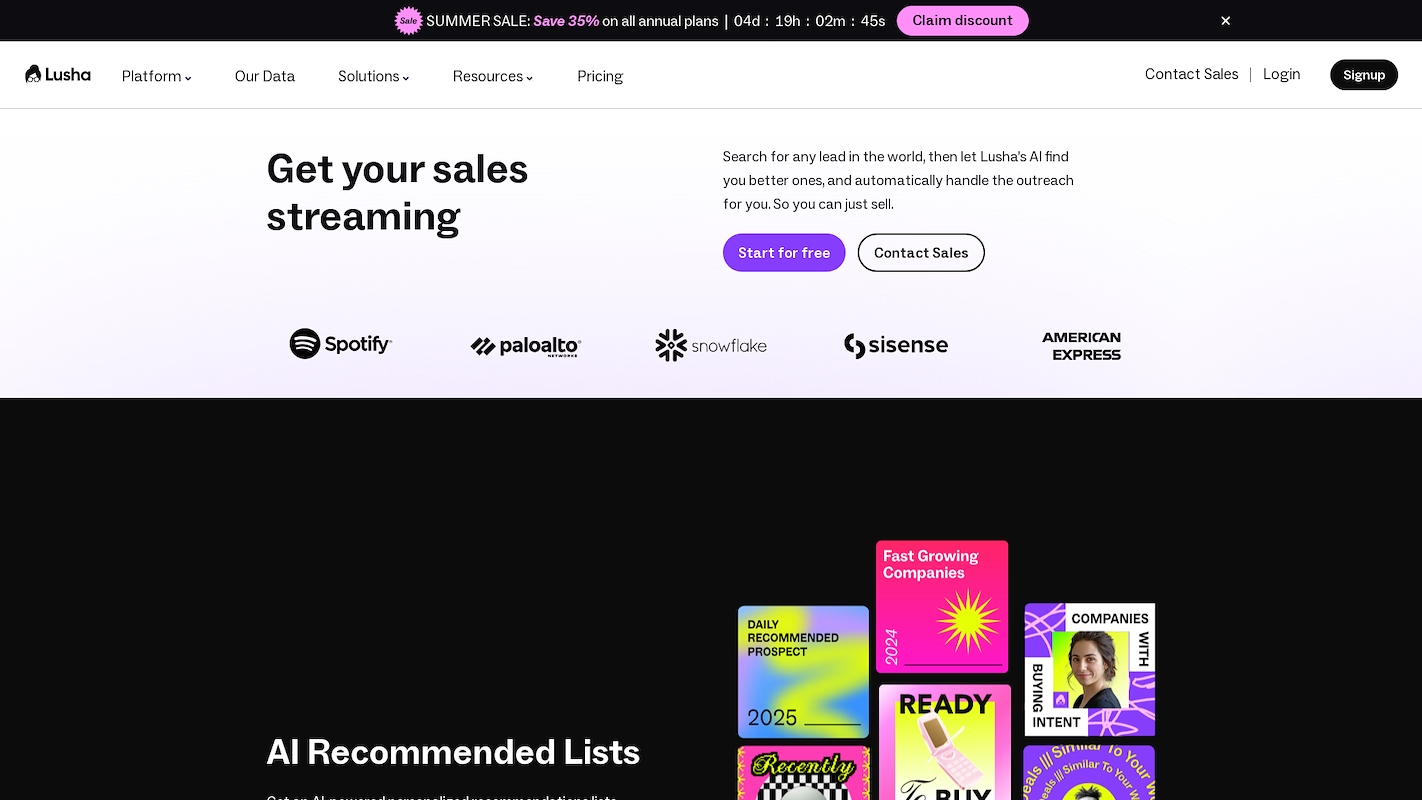
Lusha is a sales-intelligence platform that uses AI to support revenue teams. It lets users search for B2B leads worldwide and get AI recommendations for similar prospects. The platform automates outreach through multiple channels inside one workflow.
Use cases include the creation of prospect lists without manual research and the prioritization of outreach based on buyer-intent signals. Teams can also enrich CRM records to maintain current and actionable data.
Lusha's Main Features
- Records and analyzes sales meetings.
- Automates and personalizes email sequences driven by AI copy.
- Provides live, auto-updating lead lists that add fresh prospects at user-defined intervals.
- Offers AI-powered search with filters for buyer intent and funding rounds.
How Lusha Compares to Octolens
Average Review score: 4.3/5 stars based on 1,516 G2 reviews.
- Lusha offers AI Prospect Playlists that automatically refresh lead lists. This provides a continuous flow of new prospects, unlike Octolens where list building is a manual process.
- It provides a free plan for individual users, offering an entry point to test its features. This is different from the paid-only access common with Octolens.
- The platform includes buyer intent data, which helps find prospects ready to buy. This is a more targeted approach than the general contact information that Octolens provides.
- Its automated data enrichment keeps CRM records current. This is an integrated feature, while Octolens typically requires a separate tool for data cleaning.
Potential Downsides Compared to Octolens
- Some users report that Lusha's contact data can be inaccurate. Octolens, with its more focused dataset, may offer higher accuracy for its specific use case.
- The platform's broad functionality sometimes means it lacks depth in certain niche areas. As a more specialized tool, Octolens may offer more advanced capabilities for its core purpose.
- It can take time to learn all of Lusha's features. In comparison, Octolens offers a more straightforward user experience that teams can adopt quickly.
Pricing and Budget Analysis
Lusha offers a free plan and paid tiers starting at $36 per user per month. This contrasts with Octolens, which does not publicly list its pricing and requires direct contact for a quote. For detailed information on Lusha's plans, visit Lusha's official website.
4) Clearbit
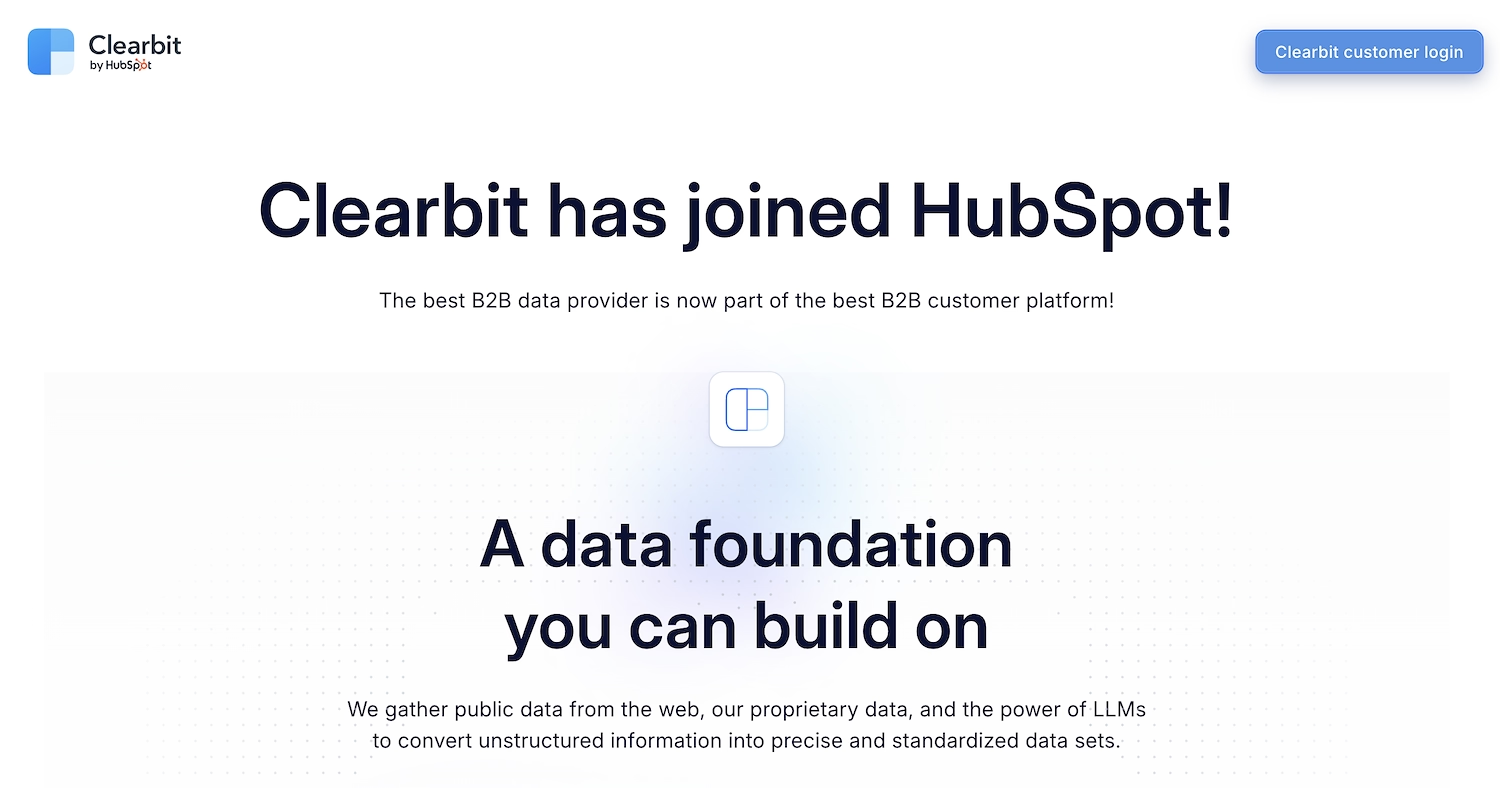
Clearbit is a marketing data engine for customer interactions. It converts anonymous website traffic into company profiles and enriches records with over 100 data points, including social profile information. This allows teams to understand their audience.
Use cases include the creation of dynamic audience segments and the delivery of personalized experiences across different channels. The data helps to target specific accounts and inform outreach strategies.
Clearbit's Main Features
- Aggregates public web data, proprietary sources, and LLM processing to deliver standardized B2B datasets.
- Adds firmographic and demographic details to lead, contact, or account records.
- Provides data points for real-time lead scoring and routing, including deep industry classifications and corporate hierarchy mapping.
- De-anonymizes website traffic to identify visiting companies that match the ideal customer profile.
How Clearbit Compares to Octolens
Average Review score: 4.4/5 stars based on 626 G2 reviews.
- Clearbit identifies anonymous website visitors, a feature not available in Octolens. This allows you to see which companies are on your site, even if they do not submit a form.
- It enriches contact records with over 100 data points, such as company technology and employee details. This offers a more complete profile than the more focused dataset found in Octolens.
- The platform provides data for real-time lead scoring and routing. This is different from Octolens, which generally requires manual lead prioritization.
- Its data can be used to shorten website forms by auto-filling fields for known visitors. This is a conversion-focused feature that is not native to Octolens.
Potential Downsides Compared To Octolens
- Some users report that Clearbit's data can be outdated. This is different from Octolens, which may provide more reliable information within its specific focus area due to its narrower scope.
- It can take a significant amount of time to integrate Clearbit into existing workflows. In contrast, Octolens offers a more direct setup, so teams can use it almost immediately.
- The tool covers many functions, from visitor identification to data enrichment. This broad approach sometimes means it lacks the specialized features for a particular task that a dedicated tool like Octolens provides.
Cost and Value Analysis
While we've covered key features and use cases in this comparison, pricing models can vary significantly between tools. For the most accurate and up-to-date pricing information, we recommend visiting Clearbit's official website.
5) Cognism
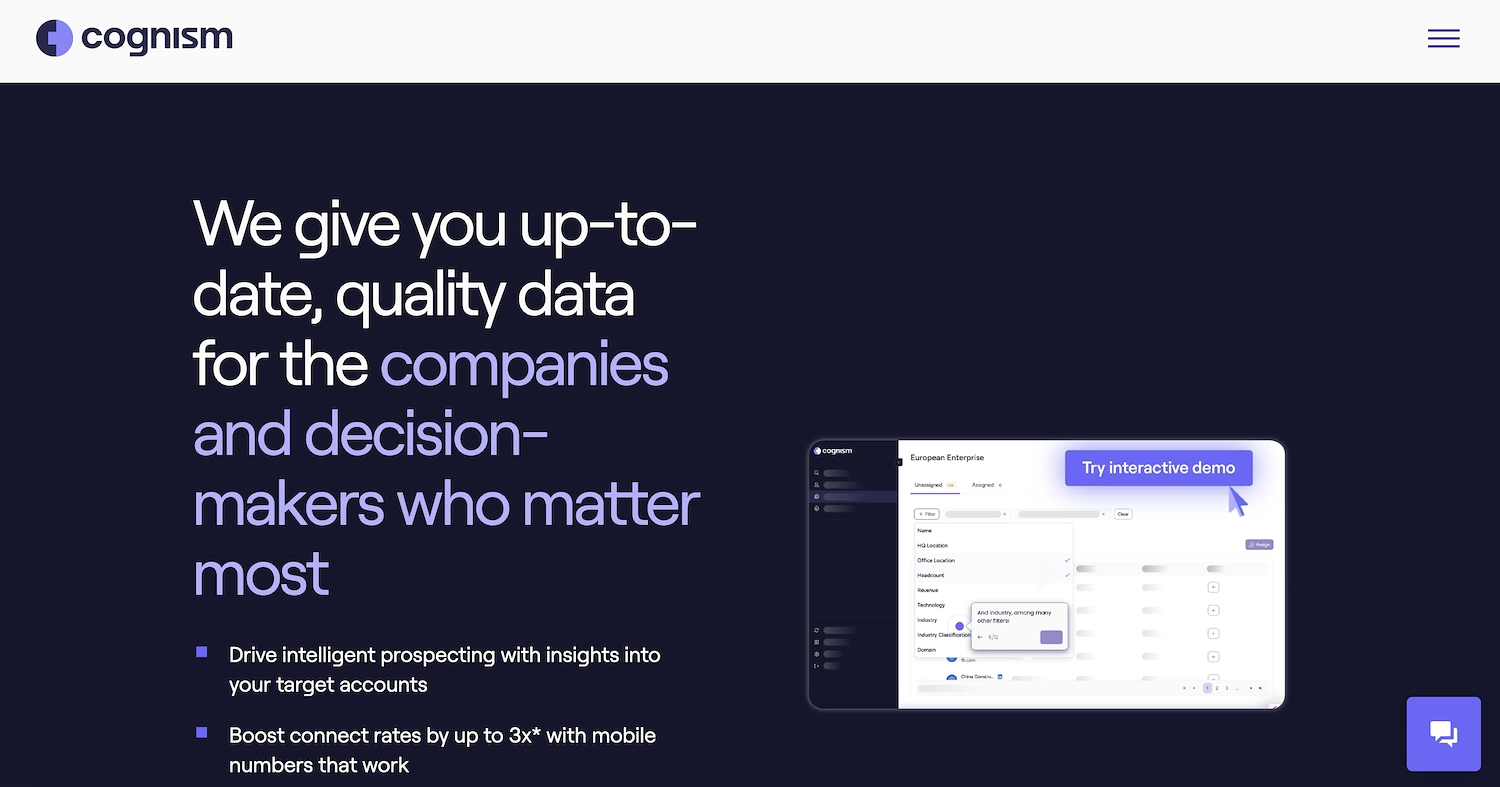
Cognism is a sales intelligence platform that provides B2B contact data. It helps sales and marketing teams find and connect with customers. The platform offers a database with verified email addresses and mobile numbers to build a predictable pipeline.
Users can build targeted prospect lists and use buyer intent data. This data signals when a company shows interest in a product, which allows teams to prioritize outreach. The tool also enriches existing CRM data.
Cognism's Main Features
- Offers phone-verified mobile numbers, known as Diamond Data, to increase connect rates.
- Provides contact data with strong coverage of mobile numbers and emails for the UK and EMEA.
- Uses signal data, such as hiring trends and funding rounds, to identify timely buying opportunities.
- Enriches CRM records in bulk using CSV or API to refresh and scale contact information.
How Cognism Compares to Octolens
Average Review score: 4.6/5 stars based on 1,033 G2 reviews.
- Cognism provides phone-verified mobile numbers, which increases connect rates, especially in the UK and EMEA. This is a more specialized data offering compared to the general contact information in Octolens.
- It uses buyer intent data to signal when a company is ready to purchase. This is different from Octolens, which requires manual lead prioritization.
- The tool automates CRM data enrichment in bulk. This contrasts with Octolens, where data cleaning often needs a separate integration.
- This platform offers GDPR-compliant contact data, which is important for teams that target European markets. Octolens does not highlight this specific compliance feature.
Potential Downsides Compared To Octolens
- Some users report that Cognism's contact data can be inaccurate. This is different from Octolens, which may offer higher accuracy within its more specialized dataset.
- The platform can take about a month to implement fully. In comparison, Octolens offers a more direct setup that allows teams to start using it almost immediately.
- Cognism covers many functions, from data provision to buyer intent signals. This broad approach sometimes means it lacks the specialized features for a particular task that a dedicated tool like Octolens provides.
Pricing and Value Comparison
While we've covered key features and use cases in this comparison, pricing models can vary significantly between tools. For the most accurate and up-to-date pricing information, we recommend visiting Cognism's official website.
A Final Recommendation: Consider 11x
If your goal is to add digital workers to your sales process, 11x is a platform to explore. It provides AI agents that manage tasks from prospecting to outreach. This offers a different way to support your sales team's efforts.
With 11x, our AI agents run your sales playbook. Alice finds accounts and starts outreach, while Julian qualifies prospects and schedules meetings. We replace separate tools for intent data, enrichment, and email warmup by combining them into one platform.
Book a demo to see 11x in action.
6) LeadIQ
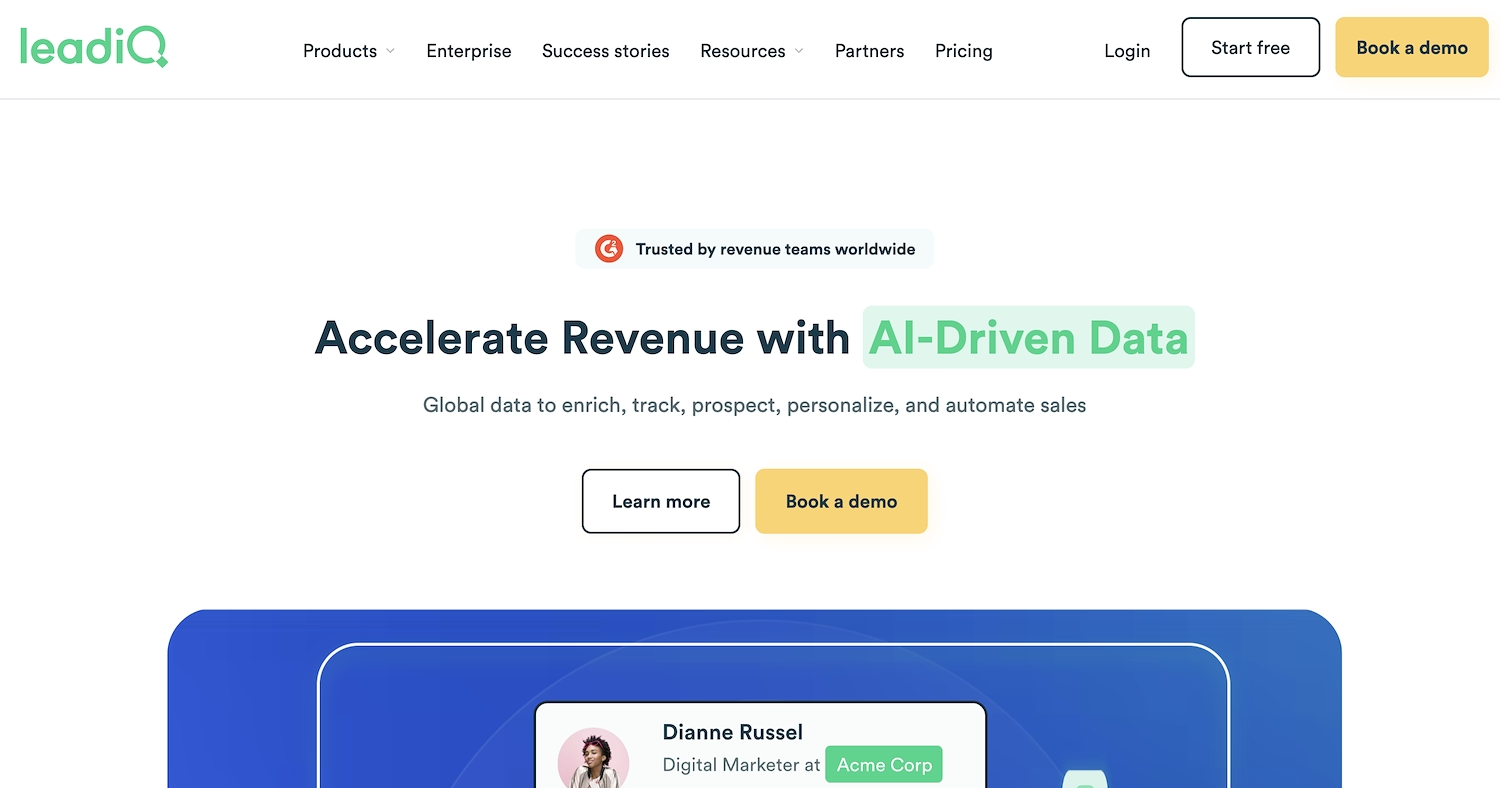
LeadIQ is a sales intelligence platform to find prospect contact data. Sales teams use it to build accurate lead lists from social platforms like LinkedIn. It captures verified contact information and syncs it to a CRM to support sales outreach.
The tool can track job changes and other social signals. This helps teams identify opportune moments for outreach based on a prospect's recent activity.
LeadIQ's Main Features
- Captures contact data from sources like LinkedIn and syncs it to CRM and engagement tools.
- Generates personalized outreach messages with an AI tool called Scribe.
- Automates the tracking of job changes and promotions to surface buying signals.
- Provides alerts when prospects change roles and recommends next actions.
How LeadIQ Compares To Octolens
Average Review score: 4.2/5 stars based on 1,097 G2 reviews.
- LeadIQ provides an AI tool, Scribe, to help write personalized outreach messages. This is a function not found in Octolens, which requires manual message creation.
- It automatically tracks job changes and sends alerts when a prospect moves to a new role. This provides timely buying signals not available in the more static dataset of Octolens.
- The tool captures verified contact information from social platforms like LinkedIn and syncs it to a CRM. This offers a specific workflow for list building, while Octolens relies on its own internal database.
- A free plan is available for individual users to test the platform. This offers a different entry point compared to the paid-only access model of Octolens.
Potential Downsides Compared To Octolens
- Some users report that LeadIQ's contact data is occasionally inaccurate. This is different from Octolens, which may offer higher accuracy within its more specialized dataset.
- The tool's focus on lead capture from social platforms means it might lack the deep, industry-specific data points that a specialized tool like Octolens provides for its core use case.
- Its workflow sometimes requires manual steps when an email is not verified. This can slow down processes compared to the more direct user experience that Octolens offers.
Cost and Value Analysis
LeadIQ offers a free plan and paid tiers starting at $45 per user per month, making it accessible for teams to test without a commitment. This contrasts with Octolens, which requires direct contact for a custom quote. For detailed pricing, visit LeadIQ's official website.
7) Seamless.AI
Seamless.AI is a real-time search engine for B2B data. It helps sales teams find verified contact information, such as emails and phone numbers. The platform builds prospect lists and integrates with CRM systems to support outreach efforts.
Seamless.AI's Main Features
- Provides a real-time search engine to find B2B contact and company data.
- Uses an AI engine to verify emails and phone numbers for accuracy.
- Offers buyer intent data that identifies companies which actively research solutions.
- Includes a browser extension to find contact information while users browse websites.
How Seamless.AI Compares to Octolens
Average Review score: 4.2/5 stars based on 1,381 G2 reviews.
- Seamless.AI operates as a real-time search engine that finds data on demand. This differs from Octolens, which typically relies on a pre-existing, static database for its information.
- It provides buyer intent data to help teams find companies ready to buy. This is a more proactive feature than the general contact data available in Octolens.
- The platform offers a free plan so users can test its capabilities without a financial commitment. This is a different access model than the paid-only structure of Octolens.
- Its AI engine verifies contact information in real time. This is a specific technological approach to data accuracy that is not a highlighted feature of Octolens.
Potential Downsides Compared To Octolens
- Some users note that the contact data found can sometimes be inaccurate or outdated. Octolens may offer more reliable data within its specific area of focus.
- The platform's credit-based system can be a limitation for teams with high-volume needs. This is different from the more straightforward subscription models that Octolens may offer.
- As a broad data-finding tool, it may not have the specialized, in-depth features for a particular niche that a focused tool like Octolens provides.
Pricing and Value Comparison
Seamless.AI provides a free plan and several paid tiers. This model offers flexibility for different team sizes. For specific details on plans and pricing, it is best to visit Seamless.AI's official website.
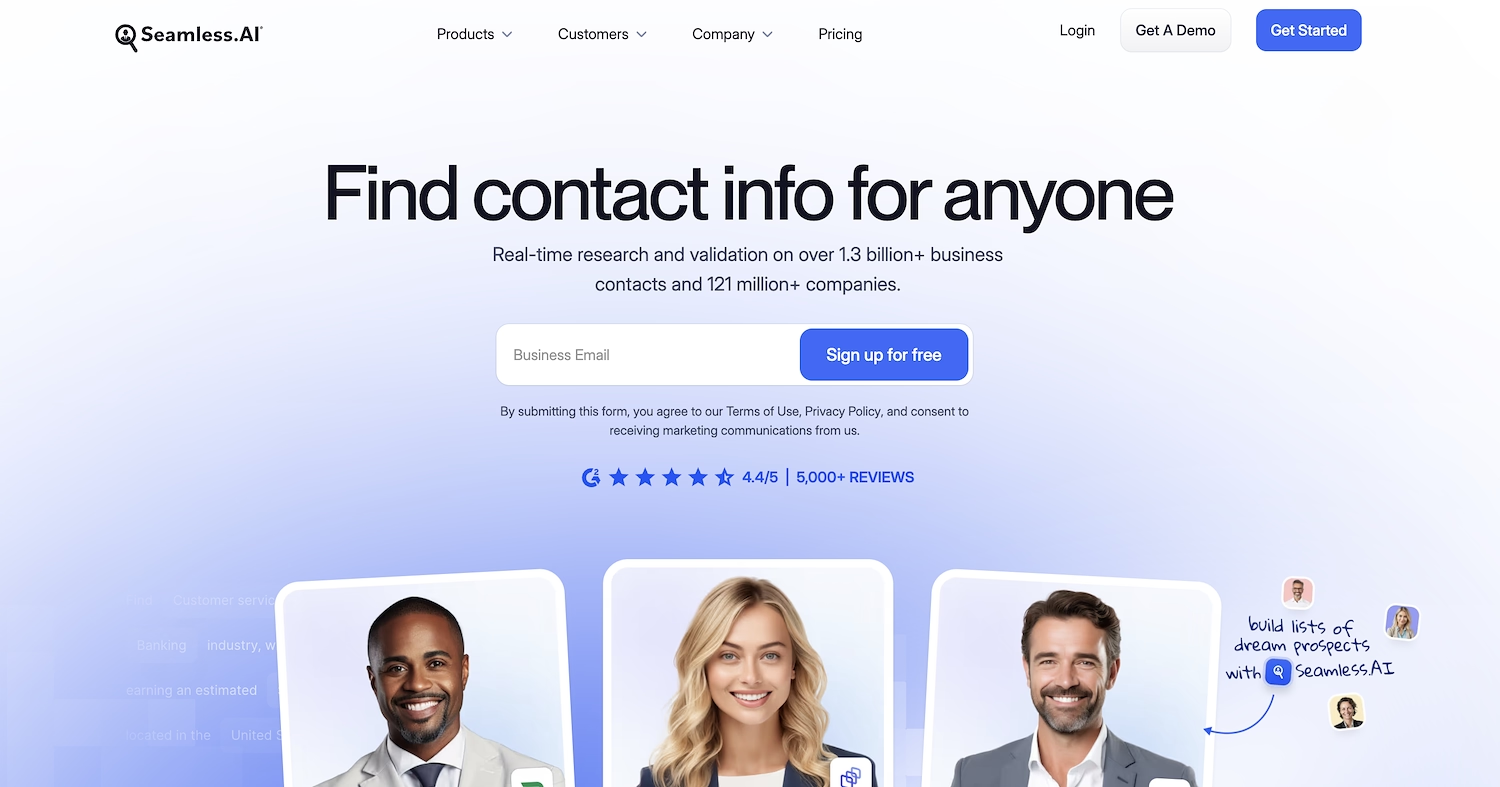
Seamless.AI is a real-time search engine for B2B data. Sales teams use the platform to find verified contact information, including emails and phone numbers. It builds prospect lists and integrates with CRM systems to support outreach efforts.
Seamless.AI's Main Features
- Surfaces prospects who show intent to buy.
- Monitors job changes and automatically delivers new contact information.
- Generates research and personalized messages for outreach using AI.
- Automates list-building to maintain a full sales pipeline.
How Seamless.AI Compares To Octolens
Average Review score: 4.4/5 stars based on 5,067 G2 reviews.
- Seamless.AI operates as a real-time search engine to find data on demand. This is different from Octolens, which uses a pre-built, static database for its information.
- It provides buyer intent data to help teams find companies ready to make a purchase. This offers a more proactive approach compared to the manual lead prioritization required with Octolens.
- The platform monitors job changes and automatically delivers new contact information. This gives sales teams timely signals for outreach, a feature not present in Octolens.
- This tool includes a browser extension to find contact information while users browse websites. This offers a different workflow for data capture compared to the internal database focus of Octolens.
Potential Downsides Compared To Octolens
- Some users report that Seamless.AI has limited contact data in certain regions outside of North America. In contrast, Octolens may provide more comprehensive information within its specialized market focus.
- The platform can have a learning curve, and some reviews note it takes time to implement fully. This is different from Octolens, which often provides a more straightforward setup for immediate use.
- Its billing practices, such as auto-renewal policies, are sometimes noted by users as inflexible. This can be a point of difference from Octolens, which may offer more transparent subscription terms.
Pricing and Value Comparison
While we've covered key features and use cases in this comparison, pricing models can vary significantly between tools. For the most accurate and up-to-date pricing information, we recommend visiting Seamless.AI's official website.
8) RocketReach
RocketReach is a platform for finding B2B contact information. It provides access to a large database of professional profiles. Teams use it for sales, marketing, and recruiting purposes.
The tool helps users build prospect lists for outreach. It also offers a browser extension to find contact details on company websites and social media profiles.
RocketReach's Main Features
- Provides a large database of professional and company profiles.
- Includes a browser extension for finding contacts on websites and social networks.
- Offers bulk lookup features to enrich lists of contacts.
- Features an API for integrating contact data into other applications.
How RocketReach Compares To Octolens
Average Review score: 4.5/5 stars based on 470 G2 reviews.
- RocketReach offers a browser extension for finding contacts on the web. This provides a different workflow compared to Octolens, which relies on its internal database.
- Its database is extensive, covering a wide range of industries and roles. This offers a broader scope for prospecting than the more focused dataset in Octolens.
- The platform is used for recruiting and marketing in addition to sales. This is different from Octolens, which appears to have a more singular focus on sales intelligence.
- It includes an API for custom integrations. This allows for more flexible data workflows than may be possible with the more contained system of Octolens.
Potential Downsides Compared To Octolens
- Some users report that contact information can be inaccurate. Octolens, with its narrower focus, may provide more reliable data for its specific use case.
- The credit-based pricing model can be a limitation for teams with high-volume search needs. This contrasts with the subscription models that Octolens may offer.
- As a generalist data tool, it may not have the deep, industry-specific data points that a specialized tool like Octolens provides for its core function.
Pricing and Value Comparison
RocketReach offers several pricing tiers based on the number of lookups, with plans for individuals and teams. For specific details on plans and pricing, it is best to visit RocketReach's official website.
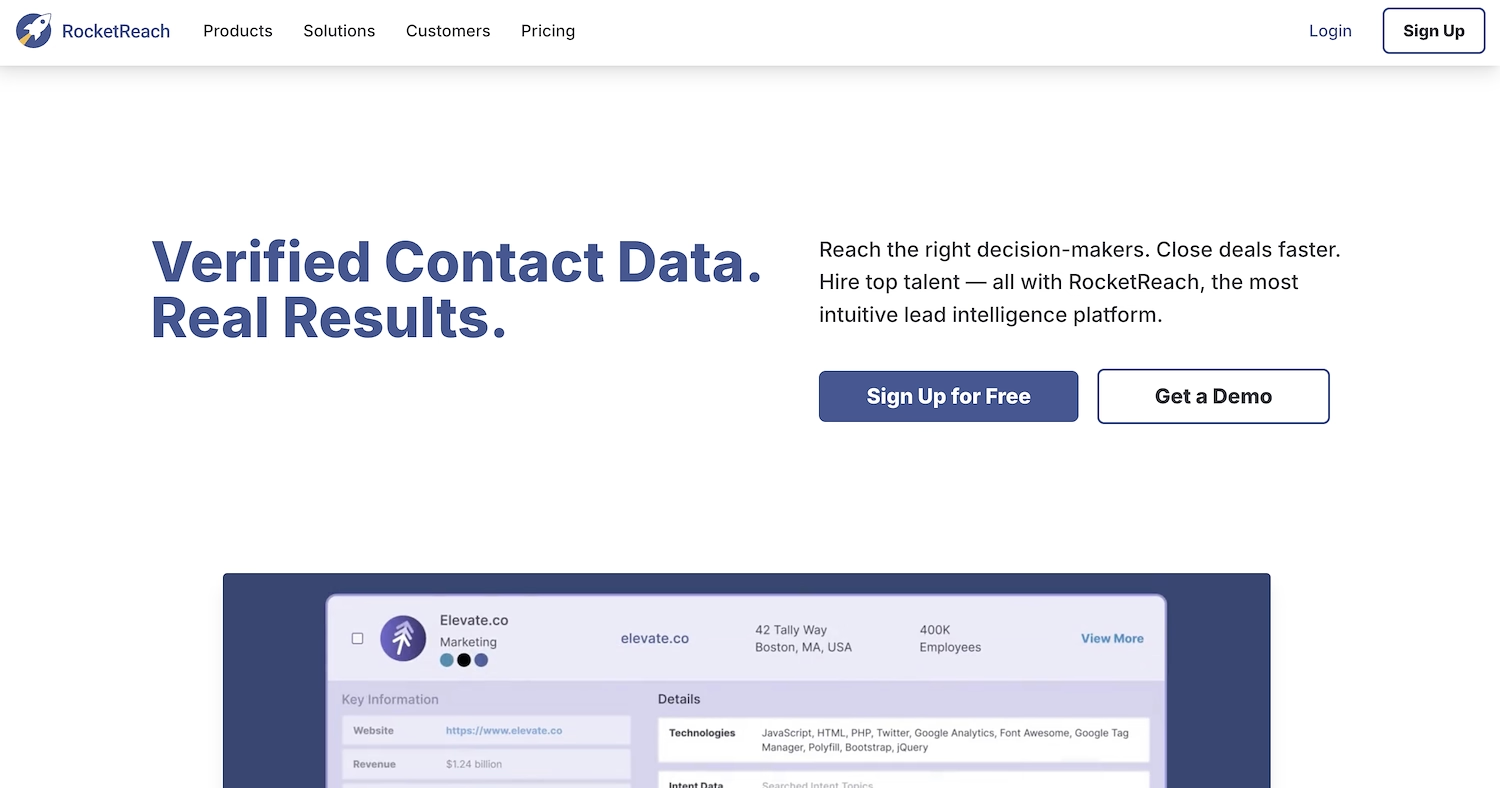
RocketReach is a platform for B2B contact information with a large database of professional profiles. Teams use it for sales, marketing, and recruitment. The tool helps users build prospect lists for outreach efforts.
It also offers a browser extension to find contact details on company websites and social media profiles. This allows users to source contacts directly from a prospect's social presence.
RocketReach's Main Features
- Provides access to a database of over 700 million professionals with verified emails, phone numbers, and social links.
- Includes advanced search capabilities, bulk lookups, an API, and browser extensions for Chrome and Edge.
- Features an automation tool, Autopilot, to create discovery and engagement workflows.
- Offers prebuilt integrations with platforms like Salesforce, HubSpot, and Salesloft.
How RocketReach Compares To Octolens
Average Review score: 4.4/5 stars based on 918 G2 reviews.
- RocketReach provides an automation tool, Autopilot, to build discovery and engagement workflows. This contrasts with Octolens, where such processes are typically manual.
- The tool offers prebuilt integrations with platforms like Salesforce and HubSpot. This provides a more connected system compared to Octolens, which often requires separate tools for a similar setup.
- Its database includes specialized information for recruiting and healthcare prospecting. This offers a wider range of use cases compared to the sales-focused dataset in Octolens.
- The platform features bulk lookups to enrich large contact lists simultaneously. This offers a more scalable data enrichment process compared to the more targeted searches in Octolens.
Potential Downsides Compared To Octolens
- Some users report that RocketReach's data can be inaccurate. Octolens may offer more reliable information within its specific focus area because its dataset is narrower.
- The platform operates on a credit system for lookups, which can sometimes interrupt workflow. This is different from Octolens, which may offer unlimited access under a subscription and provide a more fluid research experience.
- As a generalist data tool, it may not have the deep, industry-specific data points that a specialized tool like Octolens provides for its core function.
Pricing and Value Comparison
RocketReach offers a free plan and paid tiers starting at $99 per month, based on a lookup credit system. This transparent pricing contrasts with Octolens, which requires direct contact for a custom quote. For specific details, visit RocketReach's official website.
9) Crunchbase
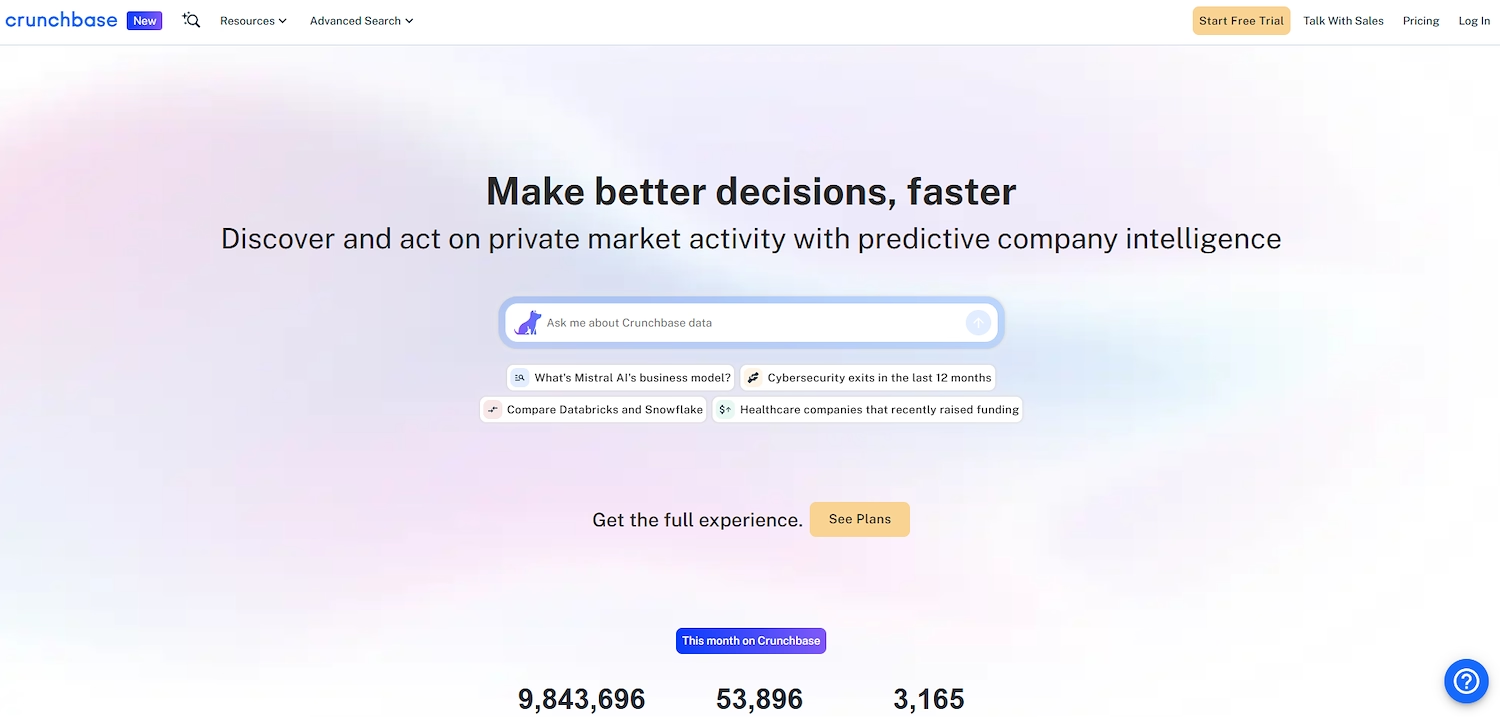
Crunchbase is a business information platform for private and public companies. It offers data on investments, company acquisitions, and leadership changes. Teams use the service to find prospects and perform market research.
The platform provides alerts on company events. This function helps users monitor market signals and competitor movements through industry news and updates.
Crunchbase's Main Features
- Provides access to company data, contact information, and industry research.
- Includes a lead builder to create prospect lists.
- Offers data segmentation and filtering capabilities to refine searches.
How Crunchbase Compares To Octolens
Average Review score: 4.5/5 stars based on 377 G2 reviews.
- Crunchbase provides industry research and data on company acquisitions. This is different from Octolens, which focuses more on contact data for sales outreach.
- It offers detailed information on company funding rounds and investments. This gives users market signals that are not available in the more static dataset of Octolens.
- The platform includes a lead builder with advanced data segmentation. This allows for more refined prospect list creation compared to the broader search functions in Octolens.
- Users receive alerts on company events like leadership changes. This helps monitor market movements, a feature not native to Octolens.
Potential Downsides Compared To Octolens
- Crunchbase centers on financial data like funding rounds. This makes it less direct for sales teams that need contact information for outreach, an area where Octolens is more specialized.
- Some users report that its contact information can be outdated. This is a potential issue for prospecting, whereas Octolens may provide more reliable data within its focused niche.
- The tool is designed for market research, which makes its features less practical for sales teams that need a simple prospecting tool like Octolens.
Pricing and Budget Analysis
Crunchbase offers transparent pricing with its Pro plan starting at $99 per user per month. This differs from Octolens, which requires direct contact for a custom quote. For the most up-to-date pricing, visit Crunchbase's official website.
10) UpLead
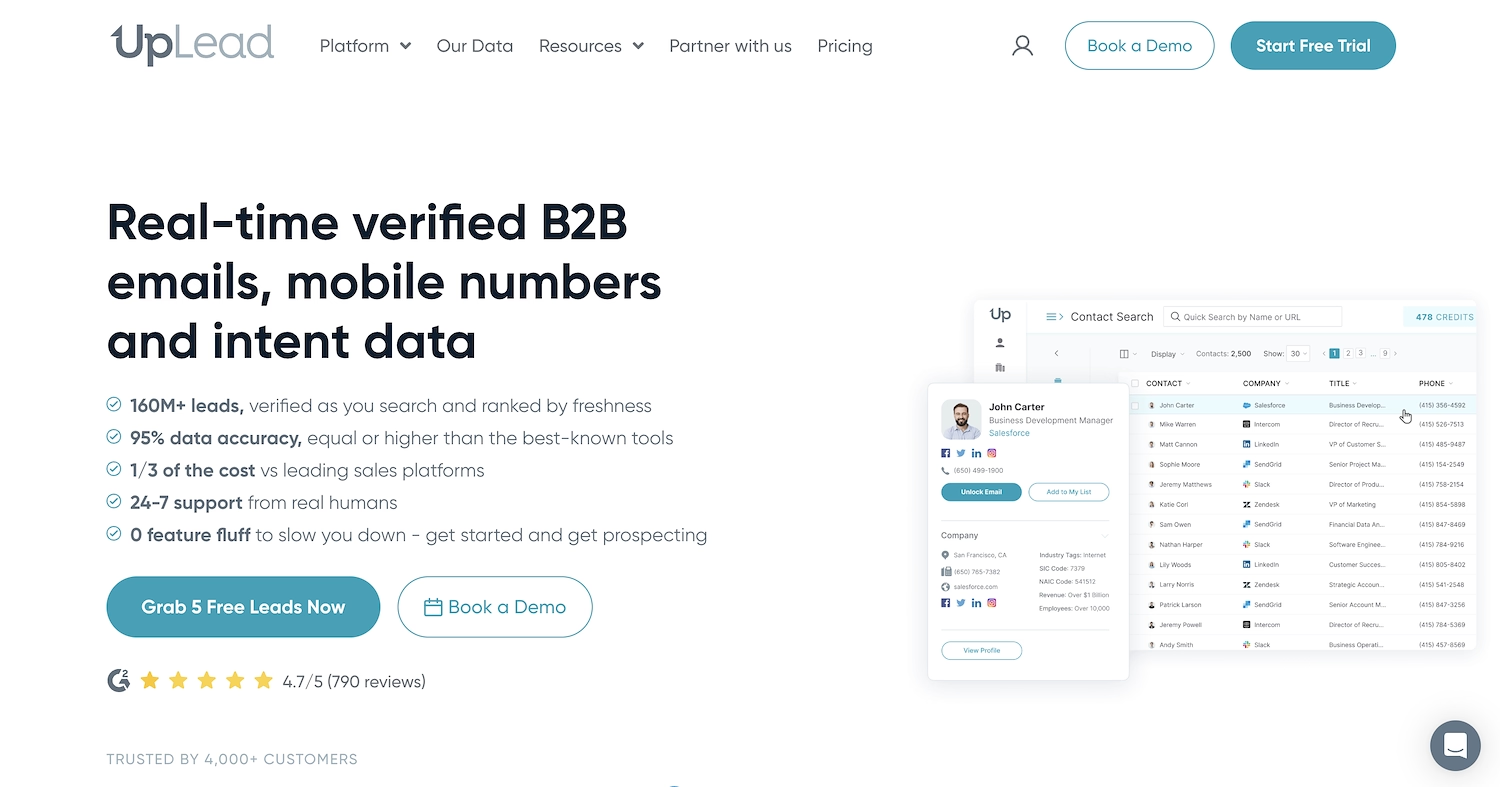
UpLead is a B2B data provider with a database of contacts and companies. Sales and marketing teams use the platform to find prospect information and create lead lists for outreach campaigns.
UpLead's Main Features
- Provides real-time verified emails and mobile numbers, along with buyer intent data.
- Uses over 50 search filters to find and target in-market buyers.
- Integrates with CRMs like Salesforce and HubSpot, as well as Zapier, to automate workflows.
- Includes data cleaning, enrichment, and lead validation to maintain data quality.
How UpLead Compares To Octolens
Average Review score: 4.7/5 stars based on 797 G2 reviews.
- UpLead provides real-time email verification, which checks data accuracy at the moment of search. This is different from Octolens, which may rely on a static database that can become outdated.
- The platform offers buyer intent data to identify companies actively researching solutions. This provides a more targeted approach compared to the general contact information available in Octolens.
- It integrates directly with CRMs like Salesforce and HubSpot to automate workflows. This creates a more connected system than Octolens, which often requires manual data transfer.
- Its search function includes over 50 filters to build highly specific prospect lists. This offers more granular control for targeting than the broader search capabilities in Octolens.
Potential Downsides Compared To Octolens
- Some users report that UpLead's contact data can be inaccurate or outdated. In comparison, Octolens may offer more reliable information within its specific niche due to its narrower focus.
- The platform's extensive features, such as its 50+ search filters, can require a learning period. Octolens, in contrast, often provides a more direct user experience for its core function.
- As a broad data provider, the tool might not offer the same depth for certain niche industries. A specialized tool like Octolens could provide more granular information for its primary use case.
Pricing and Budget Analysis
UpLead provides transparent pricing with a free trial and paid plans starting at $99 per month. This differs from Octolens, which requires direct contact for a custom quote. For detailed information on plans, visit UpLead's official website.
Which One Should You Go With?
Many variables influence the right choice for an Octolens alternative. This guide analyzed several options to help you find a tool that fits your team's specific needs and workflow.
If you want to add digital workers to your sales process, 11x is an option to consider. The platform provides AI agents that manage tasks from prospecting to outreach, combining multiple sales functions into a single system.



